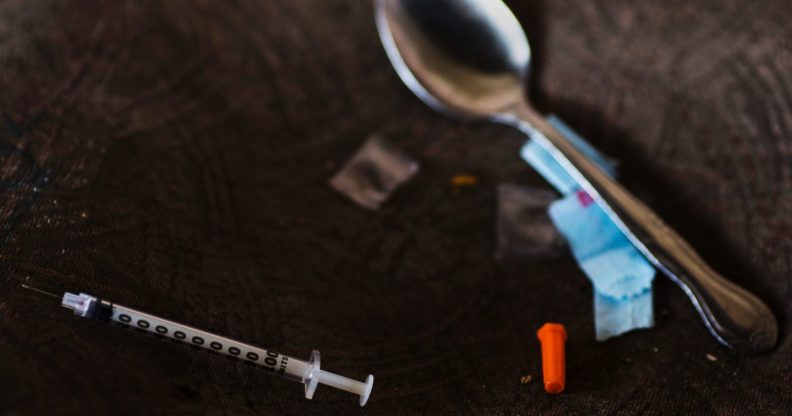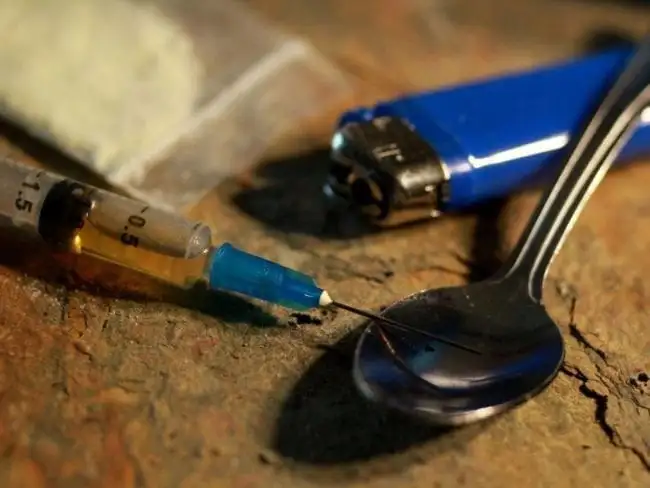What is chemsex? The sex parties for gay and bisexual men where drugs are injected or snorted

A study has found lesbian, gay and bisexual teens are more likely to use drugs than their straight peers. (DOMINICK REUTER/AFP/Getty)
Messages such as “P&P” (party and play) are the alternative opening lines for a niche community of gay and bisexual men on dating apps.
Since the advent of dating apps, men meeting in groups for casual sex in private, rather in clubs has been a natural cultural shift.
The corresponding chemsex scene has a connection with heavy drug use, which some argue has negative effects on the mental and physical health of the guests in attendance, and chemsex has been criticised by health bodies.
Chemsex parties is the general term for any sex party with drugs, whereas slamming is specifically related to parties where gay men inject drugs to get a more intense high than they would from snorting or swallowing drugs.
Drugs commonly snorted or swallowed include crystal meth, gamma hydroxybutyrate or mephedrone – but these can also be injected for greater effect.
The individuals who attend these parties take drugs specifically to have enhance the enjoyment of sex, rather than traditional drug use that may later lead to sex.

The use of drugs can lead to men staying in sexual environments for days on end, and able to continue having sex for long durations of time.
Concerns about chemsex
PinkNews has written before on reports which suggest some gay men are turning to chemsex due to loneliness, as misguided attempts to find deep bonds and compassion with other men.
A French study published in the Contemporary Drug Problems Journal recently found that many men who attend chemsex parties were either craving a sense of being loved, or actively searching for it without success.
“The suffering and loneliness that follow romantic breakups can trigger uncontrolled drug use while feelings of ‘love fusion’ between ‘slammers’ can encourage further risk-taking,” lead researcher Romain Amaro explained.
“But romantic relationships can also provide crucial symbolic and material support to place limits on drug use in ways that reduce harm.”
Many who had suffered from a serious break-up said they used drugs as a means to feeling free following the relationship ending.
Mr Amara said: “By examining the subjective, emotional, and relational rationales that underlie slamming, I show how young gay men navigate between caring for their health and their emotional ties with other men.”
The government has also vowed to clamp down on drugs used for chemsex.
The Home Office’s Amber Rudd has explained: “Chemsex carries serious physical and mental health risks including the spread of blood borne infections and viruses.
“PHE will support local areas to meet these needs by promoting and publishing guidance on effective practice, including targeted interventions and close collaboration between sexual health services and other relevant services including community groups.”

The government vowed to “pursue a strong law enforcement response and dismantle trafficking networks,” as well as expand the Alcohol and Drugs Education and Prevention Information Service.
As part of the drive, a new National Recovery Champion will be appointed to make sure adequate housing, employment and mental health services are available to help people turn their lives around.
Home Secretary Amber Rudd said: “Since becoming Home Secretary I have seen first-hand how drugs can destroy lives.”
Proponents of chemsex
However, there is the corresponding argument that chemsex parties reinforce a queerness which has been washed out recently.
João Florêncio, Lecturer in History of Modern and Contemporary Art and Visual Culture, University of Exeter explained: “In the past, queer politics used queer sex and sexuality to challenge the whole of society and its institutions.
“Today, the mainstream LGBT movement seems more concerned with assimilating into existing institutions such as marriage and the military, rather than challenging their existence.”
“The flip-side of the politics of this assimilation is that they have been pursued at the expense of a wider variety of queer sexualities, desires, pleasures, identities, and ways of being.”
“It’s in that context that I think – somewhat controversially – that chemsex emerges as a form of resistance. Chemsex is a way of surviving assimilation.”
“If this “cleaning” of LGBT culture means the destruction of queerness or deviance in one’s identity, then risk-taking can become a way in which this identity can be reaffirmed and new forms of queer belonging rehearsed – even if only temporarily.”
What happens during a slamming session

Many chemsex parties are hosted by the individual who is supplying the drugs.
Talking to the Huffington post, Alex Klineberg – a journalist who attended such parties – said: “It starts with a bunch of guys in their underwear getting high, and as they get more and more high, they lose their inhibitions.
“You can find yourself having multiple partners and going for a long period of time… It can last for 24 hours, three days, without people sleeping… this is more than a bit of drug use at the weekend”.
Why has slamming become popular?
Chemsex is often linked to hook-up apps and drug addiction. Users of apps such as Grindr and Bareback Real Time (BBRT), are able to promote their involvement with the chemsex scene on their profiles with a simple ‘P&P’ caption to link up with similar accounts.
With the use of chemsex terminology being so visible, it could be argued that the link between drugs and sex is becoming normalised.
However, Dr Jamie Hakim – a lecturer at the University of East Anglia, believes that this explanation is too simple.
He suggests that the closure of several gay clubs in London has been impactful on the rise of slamming sessions.

He told the Independent: “The gentrification of Vauxhall and its gay scene may be why a particular cohort of gay men stopped taking certain party drugs on the dance floors of Vauxhall and started taking others in different settings.
“Chemsex can be seen as a particularly intense way for groups of people to form intimate collective bonds at a time when the government’s social and economic policies attempt to make this very thing impossible”.
Dr Hakim interviewed several participants of slamming sessions and discovered that loneliness and a lack of belonging may also be a crucial cause in its meteoric rise.
One of the fifteen participants interviewed said: “In a way, you’re enjoying a private club… everyone thinks the same as you think.
“You don’t have to worry about anything because you’re going to be in an environment where you feel safe and whatever you do, whatever you think, whatever you say you’ll be very much accepted.”
A study by the London School of Hygiene and Tropical Medicine supports this idea.
Researchers conducted interviews with 30 gay men living in Lambeth, Southwark and Lewisham in 2014. This region currently has the highest rates of HIV in the UK.

They found that many of these men used chemsex as a way to facilitate a more adventurous experience – but also as a mask to hide their self-esteem issues.
Adam Bourne commented: “There is a need for specialist support for men who have sex under the influence of these drugs.
“Gay and bisexual men need better information and advice, as well as access to gay-friendly drug and sexual health services, that are able to address the psychosocial aspects of chemsex.”
What are the main dangers?
Besides the risk of drug addiction, chemsex has also been linked to rising rates of HIV with individuals more likely to carry out unprotected sex whilst under the influence.
Taku Mukiwa, head of health improvement at Terrence Higgins Trust, said: “We know that drug use can lead to people taking risks during sex that they wouldn’t ordinary take, which increases their chances of getting HIV and other sexually transmitted infections.”
While drugs can help to make you feel more confident and less inhibited, they can also cloud your judgement and decision-making abilities.
Similarly, sharing needles to inject drugs increases the chances of getting HIV or hepatitis B or C.
In 2014, The Burrell Street sexual health clinic became the first in London to hand out packs of clean syringes, spoons and thermometers for gay and bisexual men who use hardcore drugs.

Robert Palmer, a psychotherapist at Burrell Street, said: “Our slamming kits are by no means designed to encourage men to take part in this trend. They’re to ensure that if men are choosing to inject, that they are doing it safely.
“The kits contain colour-coded needles so each user can easily see which is theirs, lessening the chance of using someone else’s.”

